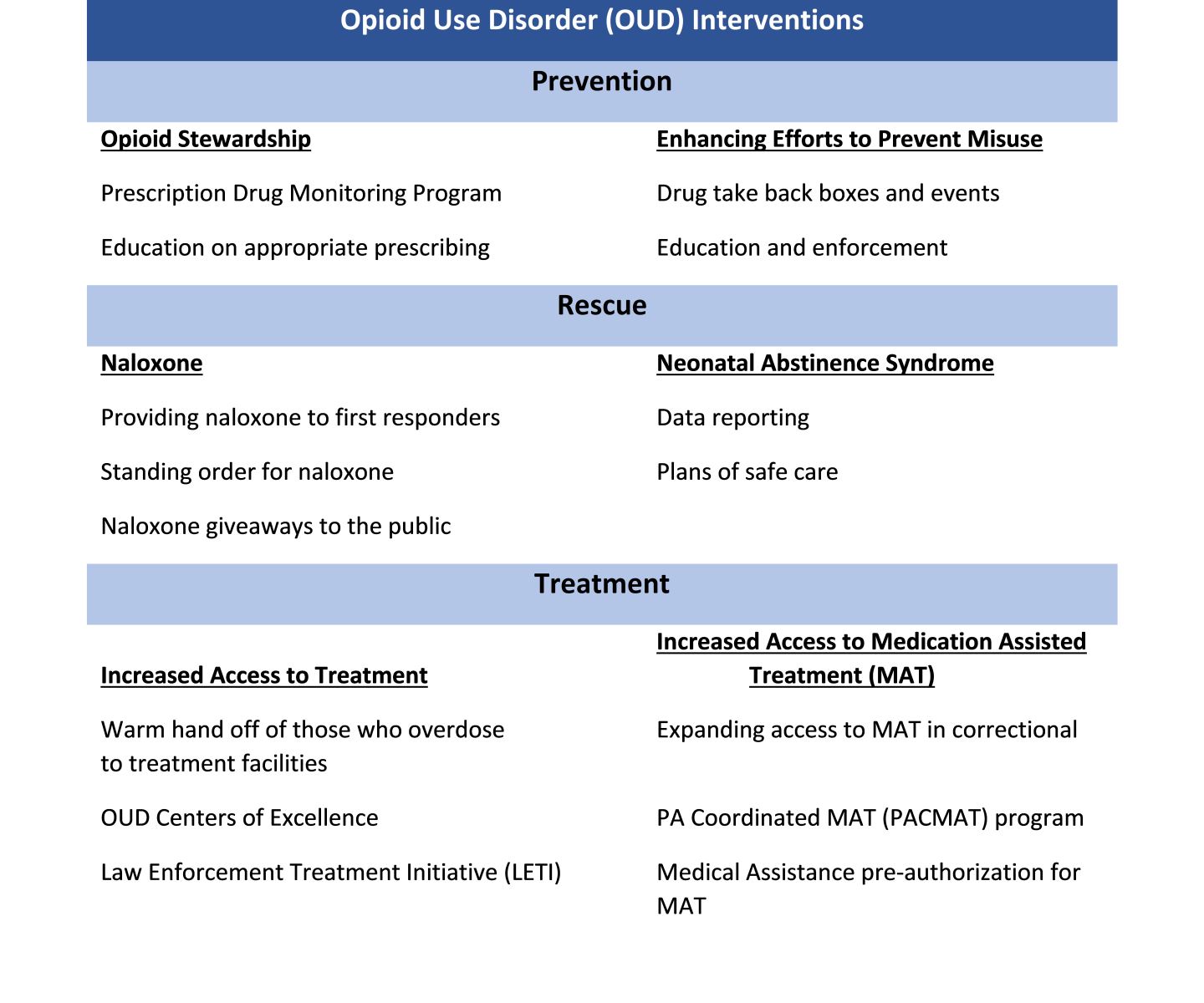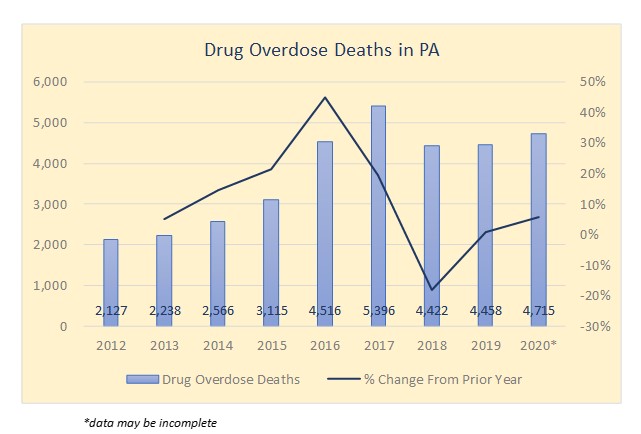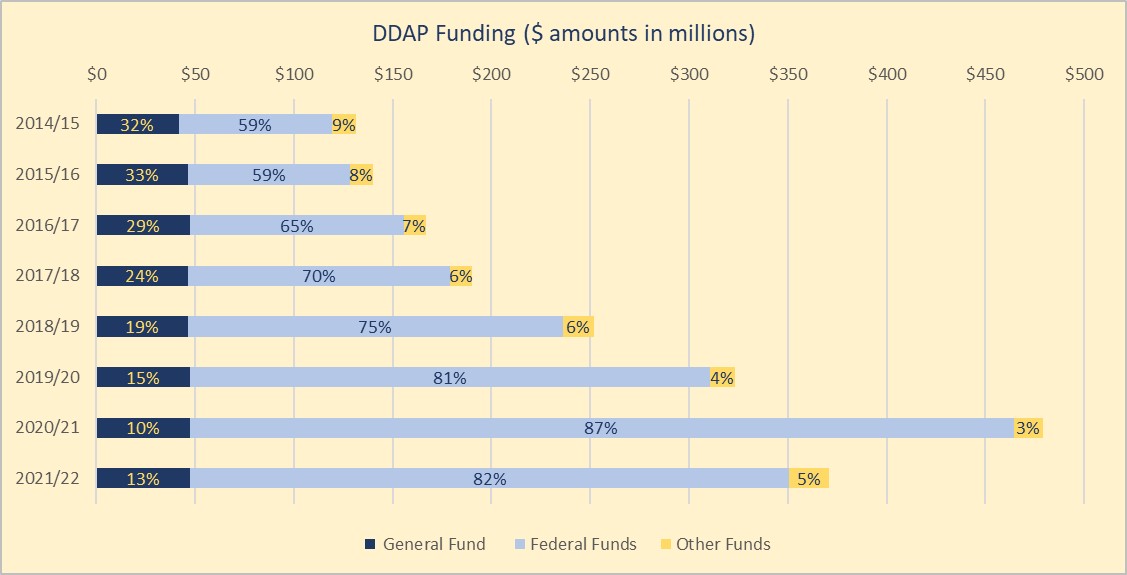Department of Drug and Alcohol Programs
By Ronni Burkhart , Assistant Executive Director | 4 years ago
Health & Human Services Analysts: Aniam Iqbal - Budget Analyst , Mara Perez - Senior Budget Analyst
Establishment
The Department of Drug and Alcohol Programs was established by Act 50 of 2010 effective July 1, 2011 to elevate the control, prevention, intervention, treatment, rehabilitation, research, education and training related to drug use, alcohol misuse, and gambling addiction. However, DDAP did not begin operating as an independent agency until July 1, 2012. Prior to the creation of DDAP, these addiction related functions were performed by the Department of Health.
Purpose
The mission of DDAP is to engage, coordinate, and lead the Commonwealth of Pennsylvania’s effort to prevent and reduce drug, alcohol, and gambling addiction and to promote recovery, thereby reducing the human and economic impact of the disease.
Single County Authorities
Prevention, intervention, treatment, and recovery-oriented services for individuals suffering from addiction are delivered in partnership between DDAP and Single County Authorities (SCAs). SCAs were established to plan and implement community specific services tailored to the needs of their respective geographic areas. There are currently 47 SCAs across PA.
Individuals can be referred to the SCA in many ways such as through a hospital visit, an overdose reversal, or through other state and local service providers. The SCA will screen individuals for any immediate care needs, such as detoxification. From there, SCAs will conduct an evaluation to determine treatment needs and appropriate level of care.
Based on the results of the assessment, individuals may receive referrals to treatment considering factors such as Medical Assistance eligibility and private insurance coverage. Through funding provided by DDAP and the Department of Human Services, SCAs may also provide money for treatment services for those who are uninsured or underinsured. Referrals may also be made to receive Case Management, which can assist individuals with needs beyond addiction services like housing, childcare, employment, and legal issues. All steps are completely voluntary on the part of the individual.

In 2017, DDAP announced the transition from the Pennsylvania Client Placement Criteria (PCPC) tool to the American Society of Addiction Medicine (ASAM) assessment tool. ASAM is a nationally recognized placement tool that derives treatment plans under a person-centered approach and uses evidence-based programming. ASAM transition activities began July 1, 2018, and full implementation is expected to be completed January 1, 2022.
Licensing
In addition to developing addiction treatment policy and funding prevention and treatment activities, DDAP also licenses drug and alcohol treatment providers. Both inpatient and outpatient drug and alcohol treatment providers are subject to licensure and/or certification whether the provider is a freestanding facility, a component of a hospital, or a health system affiliated provider. Requirements - such as those for physical space, staff credentialing, staff training, and staffing ratios - vary based on the type of provider and the addiction treatment services being provided.
DDAP currently licenses over 800 providers. Providers are subject to annual inspections and DDAP also performs as-needed reviews based on incident reports and complaints. Inspections are performed to ensure compliance with state requirements. Licensing is also a condition of federal Medicare and state Medical Assistance participation and payment.
Act 59 of 2017 requires the licensure or certification of drug and alcohol recovery houses that either receive referrals from state agencies or state-funded facilities or receive federal or state funding. Recovery houses provide a safe and stable environment that supports individuals in their recovery. DDAP has proposed regulations that are pending final approval by the Independent Regulatory Review Commission before licensure/certification of recovery houses will become effective.
Opioids
As the opioid epidemic took hold across the nation and PA, numerous interventions were implemented to try to prevent opioid misuse, rescue individuals who overdose, and treat those who become addicted.
In January 2018, Governor Wolf issued a disaster declaration in response to the opioid epidemic declaring it a public health emergency. Doing so allowed the administration to expedite aid and initiatives to help those suffering from opioid use disorder. The Opioid Command Center was established to coordinate a multi-agency response in an evidence-informed way, with DDAP being a major contributor to development of interventions. Efforts to curb the epidemic have been vast and various. The table below highlights some of the interventions implemented in PA.

Like PA, the federal government has also invested resources to combat the opioid epidemic. In 2016, the federal Substance Abuse and Mental Health Services Administration (SAMHSA) issued $485 million in State Targeted Response (STR) funding to states and territories to assist them in addressing the opioid crisis by increasing access to treatment, reducing unmet treatment need, and reducing opioid overdose related deaths. Funding has continued each year and grown considerably since the first year. Most recently, SAMHSA awarded $1.5 billion in State Opioid Response (SOR) funding to state and territories to continue their efforts related to prevention, treatment, and recovery of OUD. In addition, the focus of the federal funding has been expanded to include prevention, treatment, and recovery activities to address stimulant misuse and use disorders, including cocaine and methamphetamines.
DDAP has been the prime grantee for STR and SOR funding and has worked with the Opioid Command Center to develop interventions to prevent, treat, and support the recovery of individuals with OUD. In addition to the interventions highlighted above, some additional interventions funded through the STR and SOR funds include:
- Treatment for the uninsured and underinsured,
- Development of an anti-stigma campaign, Life Unites Us,
- Housing supports for those in OUD recovery,
- Patient-centered medical homes for pregnant women with OUD,
- Employment supports for individuals in recovery, and
- Focused engagement of targeted populations such as homeless, pregnant women, and veterans.
States, including PA, had been making progress in the fight against opioids, but the COVID-19 pandemic made a noticeable impact on that progress. After a visible change in the trajectory of overdose related deaths, 2020 appears to be one of the worst years yet for drug related overdose deaths in PA.
Finally, numerous lawsuits from states and municipalities nationwide are pending against manufacturers, suppliers, consultants, and pharmacies related to their role in fueling the opioid epidemic. The lawsuits are in various stages of the legal process, but several major cases are being negotiated by a coalition of multiple states’ Attorneys General. Act 24 of 2021 (Fiscal Code) established the Opioid Settlement Restricted Account requiring that money received by a state agency that is the result of a legal action related to opioids be deposited in the account. Additionally, money must be appropriated by the General Assembly from the account.

Gambling
In addition to supports for individuals battling drug and alcohol addiction, DDAP also provides supports for individuals struggling with gambling addiction. DDAP maintains a crisis counseling and referral hotline, promotes awareness and prevention of compulsive gambling, provides programming for individuals (and their families) with problem gambling, and conducts studies to identify at-risk populations in PA. Most services are delivered by the SCAs throughout the state and certified treatment providers contracted by DDAP. Funding for gambling related supports is provided from revenues collected on slot machines, interactive gaming, and sports betting.
Funding
DDAP receives funding to support their mission through several different sources, including state General Funds and federal funds. Federal funds are primarily received via the Substance Abuse Prevention and Treatment Block Grant and SOR funds, described earlier in detail. Multiple instances of one-time funding from the federal government has also been received to assist states with the COVID-19 pandemic’s impact on citizens related to addiction. Finally, DDAP also receives funds from two Special Funds: the State Stores Fund and the Compulsive and Problem Gambling Treatment Fund. The State Stores Fund dollars support alcohol misuse programs while the Compulsive and Problem Gambling Treatment Fund supports both gambling addiction services as well as drug and alcohol treatment services.
